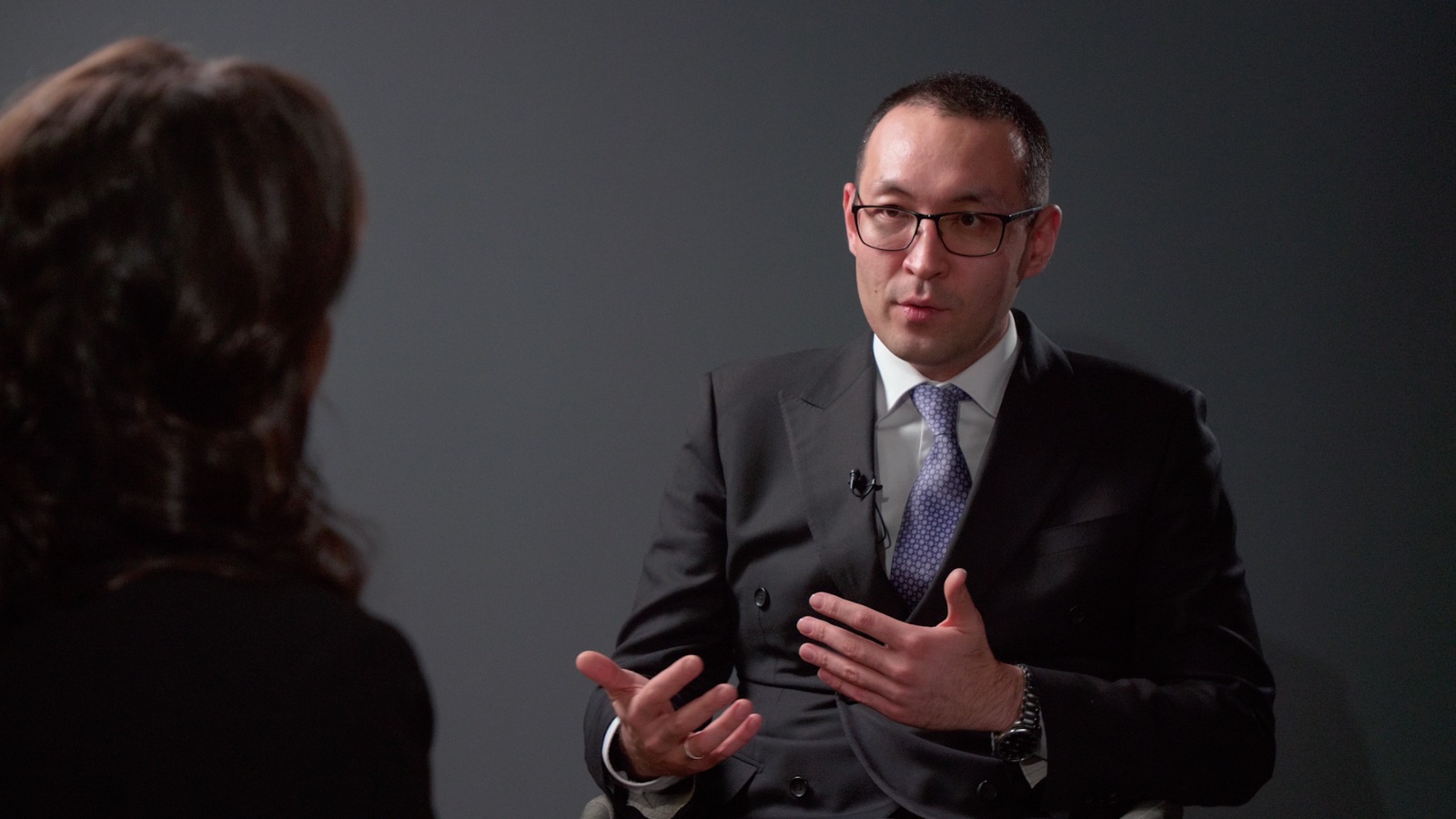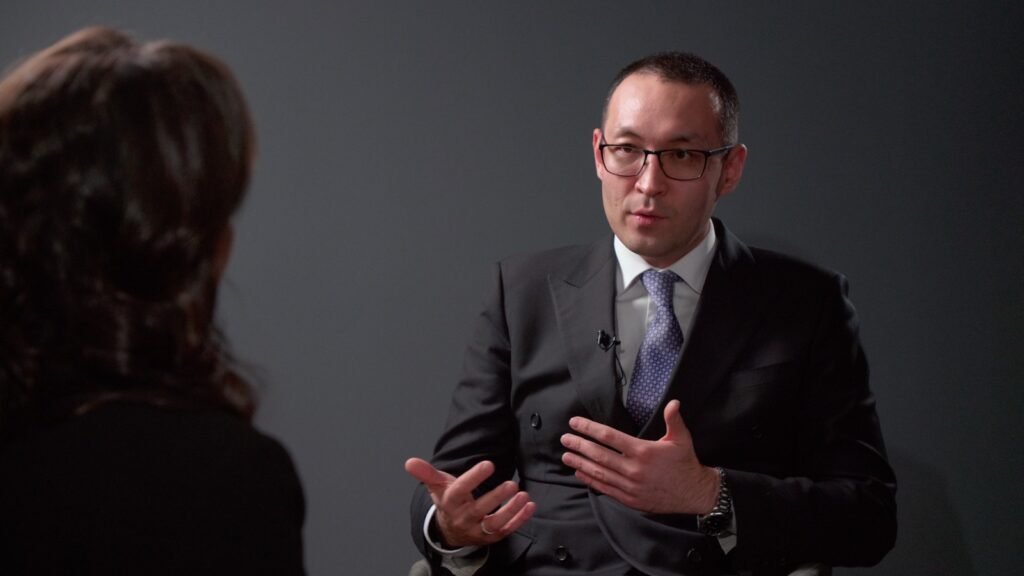ASTANA – As Kazakhstan pushes ahead with a central bank digital currency and open banking infrastructure, Binur Zhalenov, a chief digital officer at the National Bank of Kazakhstan (NBK), said the digital tenge has the potential to transform how money moves. In an interview with The Astana Times YouTube channel, he reveals why Kazakhstan needs digital currency and whether cash is still a thing in today’s world.

Binur Zhalenov is a Bolashak scholarship graduate and said he has always wanted to contribute to the development of the country. Photo credit: The Astana Times
Growing interest in digital currency
In recent years, central banks across the world have been exploring digital currency offerings. China, so far, has gone the farthest. “The most developed projects, for example, are in China. They have digital yuan, e-CNY, and the pilot project started in 2017,” said Zhalenov, who also chairs the National Payment Systems Corporation.
According to the U.S.-based Atlantic Council, 65 countries are in the advanced phase of exploration, either development, pilot, or launch.
Zhalenov said the rollout of digital tenge is an “absolutely logical step” for Kazakhstan. The project has been spearheaded by the NBK since 2021.
“We do believe that digital economy requires digital means of payment,” Zhalenov said. “Many people confuse digital money with electronic money. (…) The thing is that there should be no difference for the end consumer. The end consumer just wants secure, cheap, safe payments.”
The best of both worlds
The digital tenge can be thought of as digital cash. There are two types of money at its core. When you hold cash in your hand, that is public money issued by the central bank and backed by your government.
The money people use most often today – either in mobile banking apps or credit or debit cards – is private money. They are tied to a commercial bank and ultimately depend on that bank’s ability to meet its obligations.
“It has intermediate risk. If something bad happens with the issuer, with a commercial bank, for example, it is very hard to make your money back. When we are talking about cash, it is backed by the government, and it is more stable,” said Zhalenov.
In the case of the digital tenge, it combines the best of both worlds.
“You can use it through your own banking application. You can spend it using your debit card,” he added.
Real-world use cases
Kazakhstan’s digital tenge, developed using blockchain, a distributed ledger technology, also introduces a key innovation – programmability.
One of the most immediate opportunities lies in improving the efficiency of government spending. “Because the programmability can help us make budget spending transparent and make budget administrators accountable,” he added.
The central bank also sees more ambitious applications.
“The second use case is payment settlement infrastructure for digital assets, and that’s a huge topic. It is going to expand after recent announcements of the Trump administration,” he explained.

Assel Satubaldina and Binur Zhalenov during their conversation. Photo credit: The Astana Times
“With all these new regulations for digital assets, including cryptocurrencies and stablecoins, we, as a central bank, need to build a bridge between traditional financial infrastructure and decentralized finances so that financial stability, consumer protection, and other benefits would work. Digital tenge is exactly the bridge that helps us to bridge these two worlds,” he explained.
Digital tenge will also play an important role in cross-border payments.
Among the first consumer-facing use cases is a government-backed stablecoin, what Zhalenov deems as a “spin-off” from the digital tenge project.
“The thing is that you and I, consumers of the Kazakh banks here, in your mobile banking application, will be able to buy crypto in a secure and quite safe way, to invest in crypto, to make your cross border transactions. That’s a very straightforward use case,” he said.
But other use cases, he said, are more specialized — particularly in business-to-business (B2B) and government-to-business (G2B) payments, which are often slow and friction-heavy.
“Last year, we issued around 250 billion of digital tenge for the use case related to government spending. In collaboration with the Anti-Corruption Agency and Ministry of Finance, we enabled the so-called painting of money,” Zhalenov said.
Budget funds allocated for a specific infrastructure project are tokenized in a way that every digital tenge is programmed to be spent only on pre-approved line items listed in the project’s procurement plan.
“Every tenge goes whether it is supposed to be spent,” he said.
Moving ahead
Zhalenov expects that moving ahead, most of the real-world use cases of digital tenge will be related to government spending, including public procurement and social spending.
Roughly 60% of the budget, he noted, is socially oriented. That’s around five trillion tenge (US$9.9 billion) a year, he added, and digital tenge can accelerate this effort.
Someone applying for government aid might wait months before receiving the funds. With the programmability of the digital tenge, which is integrated into the govtech system, that could be done “instantly.”
Zhalenov is also keen to dismiss any misinterpretations. “We are not talking about stalking people. (…) That’s not the idea,” he said.
A reality check
Zhalenov brought a dose of reality when discussing the digital tenge.
“Digital tenge, of course, is not a panacea. (…) They are smart money, but in order to be smart, we should have other information systems that supply proper information for digital tenge,” he said.
“I believe that when we have a digital tenge technology, proper government databases, proper methodology, and business process, we can really tackle many problems related to corruption,” he said.
That vision is underway.
“We already have a very systematic approach with the Ministry of Finance and Anti-Corruption Agency,” he said. “We are going to find one budget program — for example, road construction — and we are going to integrate digital tenge with many information systems related to road construction to make sure that money is sent only to those suppliers that actually made their work.”
While digital tenge is not able to check if the supplier did this work or not, however it can assure that this money will not enable some malicious activity.
Cash isn’t dead
Zhalenov acknowledged there will always be room for cash, even with the highest penetration of cashless payments. The latest figures for the NBK indicate that 87% of the volume of all transactions are cashless.
“I believe there will be some place for cash,” he said. “We analyze the consumer patterns, and we do see that there are some consumers who really love cash for various reasons. Since we have even one consumer who needs cash, we, as a central bank, would provide this opportunity.”
Inclusivity, he added, isn’t about pushing everyone into digital — it’s about giving everyone options.
“We would never force people to go to digital tenge or other services. That should be a decision of the consumer. Look, you have Sweden, for example, which has very high cashless penetration, 98 or 99% already for five or ten years, but they still issue cash because there are still some segments of the market who need cash flow,” he explained.
It can also be a generational issue.
“Probably when several generations will change, and we will have only people who were born in the digital era and across their entire life were cashless, probably that might happen, but I believe we still have several decades, at least, for cash presence in our world,” he said.
Kazakhstan as a global leader
Zhalenov said he believes Kazakhstan has positioned itself among global leaders in financial technology — particularly when it comes to integration between public services and private innovation.
“Our banks and other financial market participants offer solutions that are not offered anywhere in the world,” he said.
A case in point: Kazakh consumers can apply for a mortgage entirely online — a service still unavailable in many developed markets. But digitization goes far beyond finance.
“You can apply for marriage, you can apply for divorce, you can sell your car or apartment — all fully online. That is because of the very deep synergy between fintech players and government,” Zhalenov said, highlighting the government’s open data strategy.
The result is what Zhalenov calls “super services.” It refers to integrated digital experiences that blend financial transactions with public services to reflect real-life situations. It helps banks “digitize life situations.”
New banking law
Looking ahead, Zhalenov is hopeful that legislative momentum will keep pace with innovation.
“I hope that new banking legislation – new law for banks – would enable many new types of activities in our market. I hope that the new services that we introduced, which are digital tenge, unified QR, PCP transfers, open banking, and anti-fraud, will find their consumers,” he said.
Motivation to work
With so much of Kazakhstan’s digital future tied to the office, it felt natural to ask what keeps Zhalenov motivated and what brought him into this role in the first place.
Zhalenov is a Bolashak scholarship graduate. “I always wanted to make an input to the development of our country. I believe the work that I and my team are doing is very important for not just hype words or something but for the real benefit of the people in Kazakhstan,” he said.
“For example, last year, we reached an important milestone, the payment systems of the National Bank reached 1.5 quadrillion tenge [US$3.3 trillion] in turnover. Almost every quarter, we deliver some new projects and products. (…) When your team doing something digital, then it comes to reality, and that’s the most magic thing,” Zhalenov said.
Behind all of this comes his real motivation – his family.
“I hope that our work will also benefit them,” he added.
Stay tuned for a full interview with Binur Zhalenov coming next week on The Astana Times YouTube channel.

